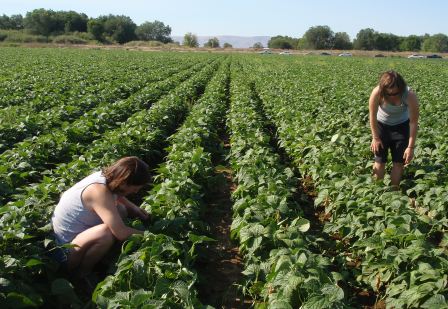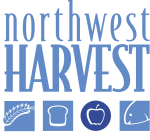In Yakima, the program has three types of gleaning volunteers: out-of-town groups, in-town groups, and individual volunteers. Our recruitment and management strategies are different for each:
-
 Out-of-town groups, or mission trips, are usually students and leaders who come to the Yakima Valley in the summer for the sole purpose of doing community service in the valley. Rural areas with high poverty and high minority populations are destinations for these trips, and the volunteers in them are typically from urban or suburban areas. The gleaning project in Yakima and Northwest Harvest’s Yakima warehouse work closely with a retreat center, Campbell Farm, who refers groups. This arrangement gives our gleaning group a steady stream of energetic volunteers during the summer months, when there is less time to plan perishable soft fruit (cherry, blueberry) gleans.
Out-of-town groups, or mission trips, are usually students and leaders who come to the Yakima Valley in the summer for the sole purpose of doing community service in the valley. Rural areas with high poverty and high minority populations are destinations for these trips, and the volunteers in them are typically from urban or suburban areas. The gleaning project in Yakima and Northwest Harvest’s Yakima warehouse work closely with a retreat center, Campbell Farm, who refers groups. This arrangement gives our gleaning group a steady stream of energetic volunteers during the summer months, when there is less time to plan perishable soft fruit (cherry, blueberry) gleans.
-
As the summer winds down, Northwest Harvest’s Yakima gleaners target in-town volunteer groups of students and church groups as the primary source of volunteers. Because later in the season is harvest time for the less-perishable hard fruits (apples, pears), our program has more scheduling flexibility to work around these groups’ schedules. With in-town groups, our program organizes special events to recruit these special-interest volunteers: Pick-a-Thon, Crop Work, Medical Day, and The Hunger Games are all yearly events that cater to a specific population (LaSalle High School students, religious organizations, the medical school and medical professionals in town, and a competition between youth groups). Each of these special-interest groups prefers to put all of their efforts into one yearly glean, making them a more reliable but less versatile volunteer source.
-
Our program targets individual volunteers for last-minute gleaning opportunities and for gleaning small farms or residential trees. These gleaners volunteer more regularly and are interested in community and in socializing with familiar faces while they glean. This is the most important group to build a personal connection with. Go out of your way to accommodate special needs, especially in terms of transportation. Our program also invites our individual gleaners out for a meal or drinks after a glean to give everyone a chance to socialize and create an even stronger and more vibrant community. Word of mouth is the most effective recruitment strategy for these volunteers, and our program encourages current volunteers to invite friends and colleagues to glean with them.
Volunteer Retention
The gleaning program in Yakima uses three-fold approach to retain volunteers:
-
Make a personal connection. Volunteers return to an organization not only because they support its mission but because they made a personal connection with something or someone there. Try to facilitate connections between volunteers by splitting them into small groups or, if you have time, work next to volunteers and engage them in conversation.
-
Stress the importance of your work. Meaningful work is the great motivator. When volunteers feel that they are engaged in challenging yet meaningful work, their investment in that work increases because they feel good about accomplishing it. Don't forget to remind volunteers how important their work is.
-
Have fun!
Be an Advocate
Networking is essential to being an advocate for the gleaning program in your community. When at community events, or while participating with another community organization, talk to folks about your program and the great things you do for the community. This benefits your organization in several ways. First, and foremost, it allows for community members to see the face behind the program and builds trust. This is crucial in smaller or rural communities where relationships and who you know are vital to a program’s or an organization’s success. It is also a great way to share your passion for the goals of the program. This is a useful tool to build enthusiasm for the program and allows for folks to see how their skills can help the program succeed. Additionally, networking will expand the program into new ventures and possibly fill another need in your community.

 Out-of-town groups, or mission trips, are usually students and leaders who come to the Yakima Valley in the summer for the sole purpose of doing community service in the valley. Rural areas with high poverty and high minority populations are destinations for these trips, and the volunteers in them are typically from urban or suburban areas. The gleaning project in Yakima and Northwest Harvest’s Yakima warehouse work closely with a retreat center, Campbell Farm, who refers groups. This arrangement gives our gleaning group a steady stream of energetic volunteers during the summer months, when there is less time to plan perishable soft fruit (cherry, blueberry) gleans.
Out-of-town groups, or mission trips, are usually students and leaders who come to the Yakima Valley in the summer for the sole purpose of doing community service in the valley. Rural areas with high poverty and high minority populations are destinations for these trips, and the volunteers in them are typically from urban or suburban areas. The gleaning project in Yakima and Northwest Harvest’s Yakima warehouse work closely with a retreat center, Campbell Farm, who refers groups. This arrangement gives our gleaning group a steady stream of energetic volunteers during the summer months, when there is less time to plan perishable soft fruit (cherry, blueberry) gleans.